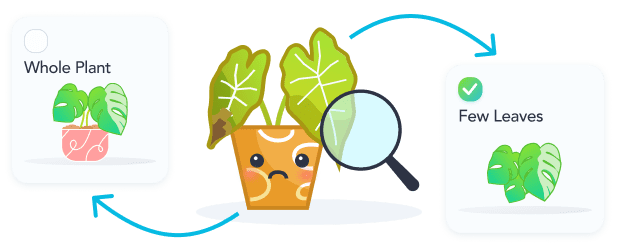Care Guides for Raindrop Plant
Every 7d
Recommended Frequency
1 /2 cup of water
Recommended Amount
Caring for a raindrop plant involves understanding its watering needs. Typically, watering every 3 days is sufficient. Each session should involve about ½ cup of water, ensuring the soil is moist but not waterlogged. ...
Every 30d
Recommended Frequency
Caring for your Raindrop Plant involves a regular fertilization schedule to ensure its health and growth. It's important to fertilize your plant once a month during its active growth periods, which are in the spring and ...
Indirect Sun
Recommended
The Raindrop Plant, also known as Peperomia polybotrya, thrives best in indirect or filtered sunlight. Direct sunlight can scorch its leaves, leading to discoloration and damage. Therefore, placing your Raindrop Plant ne...
Every 730d
Recommended Frequency
As a professional botanist, I'd like to share some essential tips on repotting your Raindrop Plant to ensure its health and growth. Repotting is a crucial aspect of plant care that often gets overlooked, but it can signi...
When caring for a Raindrop Plant (Peperomia polybotrya), it is essential to maintain an appropriate temperature range to ensure its health and growth. The ideal temperature range for this plant is between 60°F and 85°F, ...
Recommended Soil
For the raindrop plant, the recommended soil type is Peat Soil. This choice is due to its excellent moisture retention capabilities, which are ideal for the raindrop plant's hydration needs. Peat Soil is acidic and helps...
When caring for a Raindrop Plant (Peperomia polybotrya), maintaining the right humidity is crucial for its health. This plant thrives in environments with high humidity, ideally between 50% and 80%. While it can ...
Questions about Raindrop Plant
A raindrop plant, also known as Peperomia polybotrya, is a popular houseplant cherished for its unique, raindrop-shaped leaves. Native to South America, it thrives in indirect light and requires minimal care, making it a...

Toxicity of Raindrop Plant

Common Pests and Diseases
Root Rot
Overwatering
To address root rot, start by reducing your watering frequency, allowing the soil to dry out slightly between waterings. If the plant is already affected, remove it from its pot and trim away any black, mushy roots with sterilized scissors. Repot into fresh, well-draining soil and a clean pot. Ensure the pot has adequate drainage holes. Monitor the plant's recovery closely, adjusting care as necessary to prevent recurrence.
Leaf Curling and Dropping
Underwatering
To address leaf curling and dropping due to underwatering, it's crucial to establish a consistent watering schedule that keeps the soil evenly moist but not waterlogged. Check the soil moisture by inserting your finger about an inch deep; if it feels dry, it's time to water. For raindrop plants, using lukewarm water is advisable to avoid shocking the plant's roots. Adjust your watering frequency with seasonal changes, as plants may require more water during warmer months and less during cooler periods.
Mealybugs Infestation
Mealybugs are small, soft-bodied insects covered with a white, waxy, cotton-like substance. They typically infest the undersides of the leaves and stem joints, sucking sap and weakening the plant.
To manage a mealybug infestation, start by isolating the affected plant to prevent the pests from spreading. Gently wipe off the mealybugs using a cotton swab dipped in rubbing alcohol. For more severe infestations, apply insecticidal soap or neem oil directly to the pests, ensuring to cover all infested areas thoroughly. Repeat the treatment every 7-10 days until the infestation is under control. Regularly inspect the plant and maintain proper care to prevent future outbreaks.
Leaf Spot Disease
Fungal or bacterial pathogens
To manage leaf spot disease, it's crucial to maintain a clean environment around your raindrop plant. Remove and dispose of any infected leaves to prevent the spread of the disease. Improve air circulation around the plant to reduce humidity levels, which can exacerbate the problem. If the infection is severe, applying a fungicide or bactericide, as appropriate, can be effective. Always follow the product's instructions carefully. Preventive measures include avoiding overhead watering to keep the leaves dry.

Related Plants














